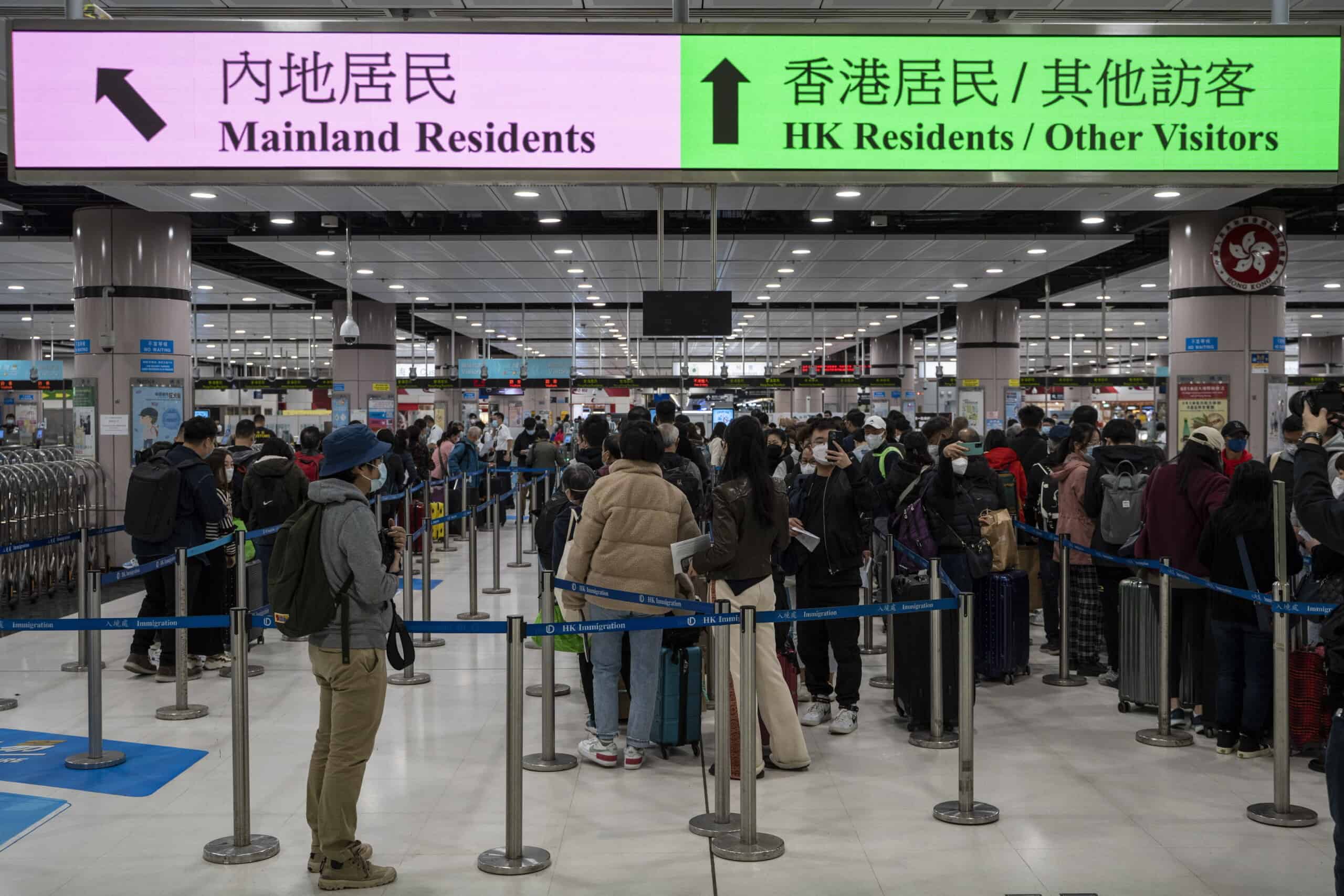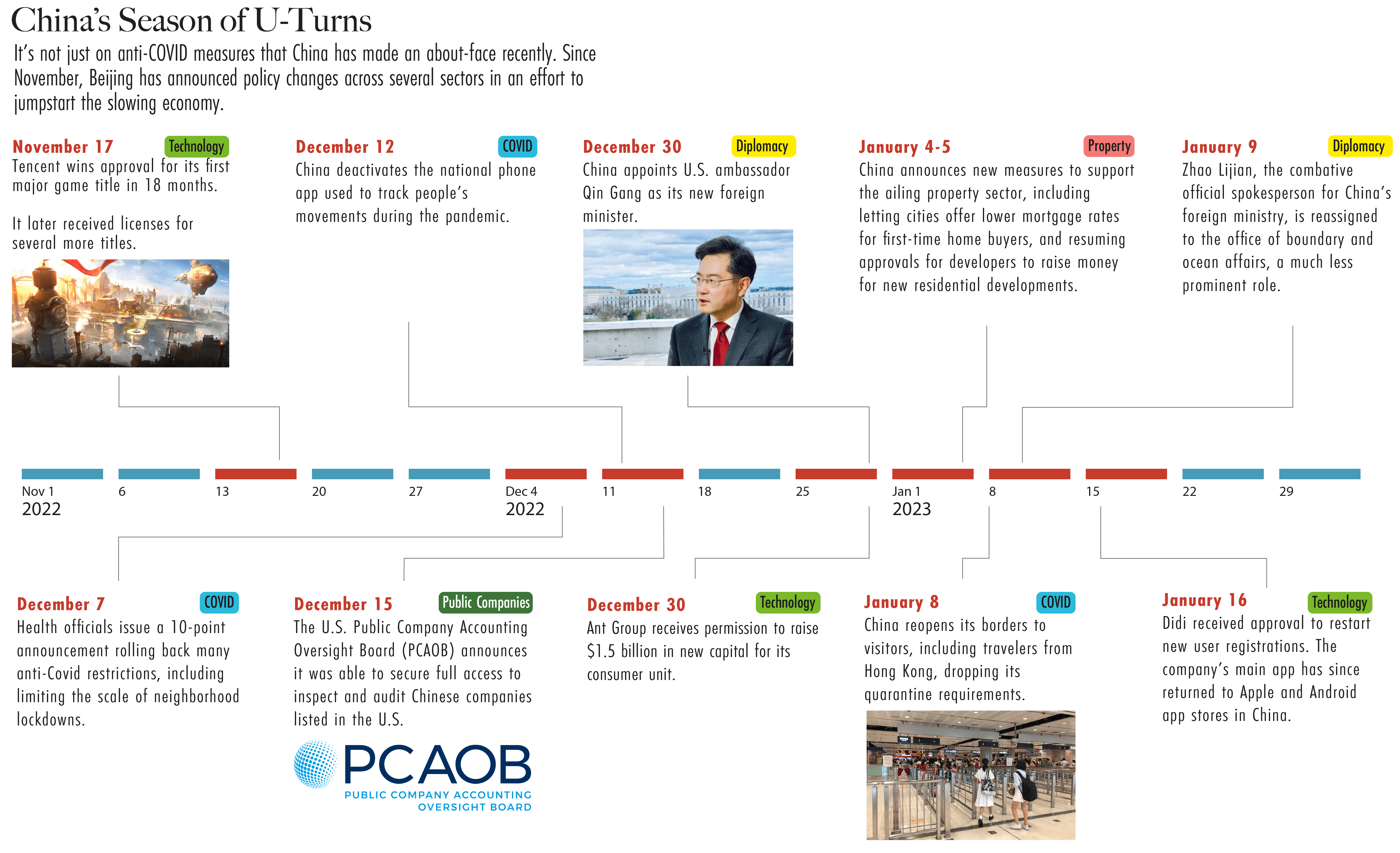
If 2021 could be characterized as China’s year of crackdowns, these last few months might be called its season of u-turns.
It’s not just zero-Covid where China has changed its tune. On property, tech, foreign direct investment and diplomacy, Beijing seems to be adjusting its position too. This week, The Wire looks at China’s recent policy changes: the sectors affected, what’s changed, and what may stay the same.

TECH COMPANIES
Background: Private technology companies have had a brutal few years after Beijing launched a slew of investigations and new rules for the sector, hammering their share prices. Some of the hardest hit firms included ride-hailing company Didi, which was forced to delist from the New York Stock Exchange in May; as well as Alibaba and Ant Group, two firms founded by Jack Ma.
What’s changed: In January, Guo Shuqing, the head of China’s Central Bank, announced that the campaign to “rectify” Chinese internet companies’ businesses was basically complete. There are other signs that regulators are loosening up:
- Didi Global received permission to restart new user registrations on its app this week.
- Fintech company Ant Group this month won approval to raise $1.5 billion in new capital.
- Tencent, a major Chinese video gaming operator, secured approval in November for its first new game in 18 months. It received several more licenses alongside domestic rival NetEase in December.
PROPERTY

Background: China’s economically vital real estate sector has been in crisis since 2020, when Beijing introduced policies intended to cool the market. Restrictions on developers, known as the “three red lines,” made it harder for heavily indebted companies like Evergrande to raise capital. China’s property developers defaulted on more than 140 bonds in 2022, according to Bloomberg data.
What’s changed: In recent weeks, Beijing has announced new support measures to rescue the struggling property sector, after residential property sales fell by almost 30 percent in 2022. These include:
- Lower mortgage rates for first-home buyers.
- Permission for some developers to raise new funds for residential developments for the first time since 2021.
- A possible easing of the “three red lines” policy, which would allow developers to borrow more, according to reporting by Bloomberg, citing anonymous sources.
Experts say: “The three red lines are less relevant at this point because developers are having a hard time borrowing regardless of where they are along those regulatory measures,” says Logan Wright, a partner at Rhodium Group who leads the firm’s China markets research. Wright is skeptical about the loosening of those restrictions. “The problem at this stage really is risk aversion across the sector.”
DIPLOMACY


Demoted: Zhao Lijian, formerly official spokesperson for the Foreign Ministry, now at the office for boundary and oceanic affairs. Promoted: Qin Gang, former Chinese Ambassador to the U.S., now Foreign Minister
Background: Chinese diplomats had in recent years adopted an increasingly aggressive posture, a trend referred to by state media as “Wolf Warrior diplomacy.” Among the most prominent “Wolf Warriors” was Zhao Lijian, an official spokesperson for the Foreign Ministry. High-level meetings between senior U.S. and Chinese officials had slowed to a trickle meanwhile.
What’s changed:
- Zhao was transferred to the Foreign Ministry’s office for boundary and ocean affairs earlier this month, a much less prominent position.
- Qin Gang, China’s ambassador to the U.S., was promoted to foreign minister: before leaving Washington D.C. he penned a series of parting messages showering praise on the United States.
- Vice Premier Liu He this week told the World Economic Forum at Davos that “China’s national reality dictates that opening up to the world is a must, not an expediency. We must open up wider and make it work better.”
- Liu and U.S. Treasury Secretary Janet Yellen held their first in-person meeting this week, while U.S. Secretary of State Antony Blinken will make his first official visit to China in early February.
Experts say: Don’t read too much into the diplomatic reshuffle, or the softer tone from Beijing.
- “There’s a tendency to speak about wolf warrior diplomacy as if it’s a small group of people pushing China in that direction, but… it’s not really about a distinctive group of people. It’s a tactic that smart, talented individuals use to serve their interests,” says Peter Martin, author of China’s Civilian Army: The Making of Wolf Warrior Diplomacy. “Qin Gang seems to be very comfortable playing the role of both wolf warrior and charmer in chief.
- “I’m reluctant to interpret or portray it as a fundamental shift in Chinese foreign policy. I see it at best as a change in style,” says Bonnie Glaser, director of the Indo-Pacific program at the German Marshall Fund, a think tank. “If we look at their posture towards Taiwan, their harassment in the South China Sea and operations around the Senkakus [islands between Japan and China known by the Chinese as the Diaoyu], I don’t see a change at all. Even if they were to drop the wolf warrior diplomacy, it wouldn’t be significant if it wasn’t accompanied by a change in [China’s] actions.”
U.S. PUBLIC LISTINGS

Background: Chinese companies have been finding it hard to list on U.S. stock markets since regulators in China introduced rules that make it harder for firms which hold sensitive data to list abroad. Meanwhile, the U.S. Securities and Exchange Commission threatened last year to delist more than 80 Chinese firms under a new law which allows the regulator to ban the trading of companies whose audit records can’t be inspected by America’s audit watchdog.
What’s changed:
- American and Chinese officials reached an agreement in August that would allow the U.S.’s Public Company Accounting Oversight Board (PCAOB) to conduct on the ground inspections in Hong Kong, a compromise that prevented a mass delisting from U.S. bourses. In December, the watchdog confirmed that it had gained access to the audit papers of selected Chinese companies.
- China is warming up to new IPOs of Chinese companies in the U.S. Adult edtech company QuantaSing Group is gearing up to become the first Chinese firm to list in the U.S. this year. Another firm, Hesai Technology Co., a Xiaomi-backed producer of sensors for autonomous vehicles, filed for a U.S. IPO this week.

Eliot Chen is a Toronto-based staff writer at The Wire. Previously, he was a researcher at the Center for Strategic and International Studies’ Human Rights Initiative and MacroPolo. @eliotcxchen



